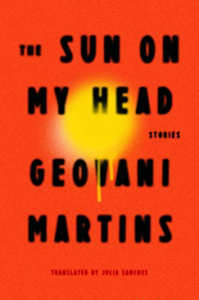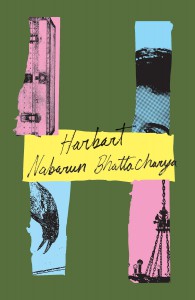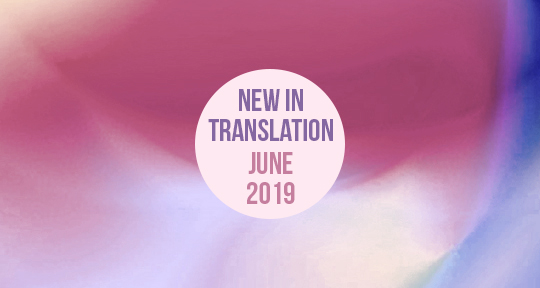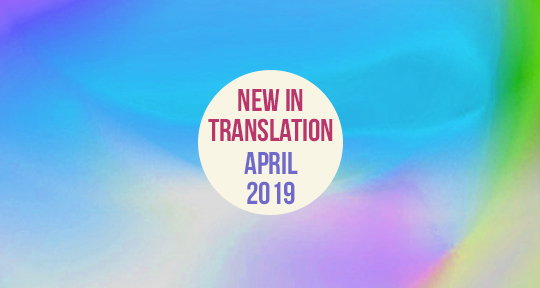Not sure what to read this summer? Our team has you covered with reviews of this month’s most anticipated literature in translation, including a Brazilian bestseller set in the favelas of Rio de Janeiro, an Egyptian writer’s take on life in the USSR, and an entertaining novel from a beloved Bengali author.

The Sun on My Head by Geovani Martins, translated from the Portuguese by Julia Sanches, Farrar, Straus and Giroux, 2019
Reviewed by Daniel Persia, Editor-at-Large for Brazil
Look out for blowtorches and the BOPE in Geovani Martins’s debut, The Sun on My Head, a collection of thirteen short stories that bring us into the heart of twenty-first century life in Rio’s favelas. Tensions run high between the police, drug slingers and traffickers, and the men, women, and children trying to live their everyday lives. Martins shows us that the language of the favelas is just as legitimate as the language of the academy, keeping “literature” true to everyday form. Julia Sanches preserves this legitimacy in English, delivering a carefully crafted translation filled with colloquialisms, slang, and Portuguese. The result is “some real trifling shit”—a wild ride that exposes us to the complexities of life in the periphery and the complexities of translating that life from one language into another.
Published in Brazil just last year, 2018, O sol na cabeça became an instant bestseller—a literary sensation that brought the voice of twenty-six-year-old Martins into the spotlight. Martins draws on his experiences of living in a favela to paint a modern-day picture of an ever-evolving Rio—particularly around the time of two major international events: the 2014 World Cup and the 2016 Olympics. In “Spiral,” we see how racial and class profiling begins at a young age, and how irrational assumptions are perpetuated through inherited distrust. Those who live in the favelas are feared by the private school kids, the teenagers taking tennis lessons and the people waiting, anxiously, at the bus stop. “I remembered how that same old woman who’d trembled with fear before I’d given her reason to certainly hadn’t given any thought to how I probably also had a grandma, a mother, family, friends,” the narrator reveals, in a statement that demonstrates one of the overarching premises of the collection: to turn these stories on their head, to legitimize the experiences of those who face prejudice by representing them as whole human beings. The old lady walking on the street, clutching her bag, eyes turned sideways, isn’t the one telling the story anymore…
Martins takes us in and out of the favelas, introducing us to characters who are often in the heat of action (or one step away). In “Russian Roulette,” a young Paulo traces his dad’s gun down his body, into his pants, “savoring the hot-and-cold sensation”—a sign of both his innocence and a complicated relationship with power. In “The Case of the Butterfly,” a young boy fails to save a butterfly as it flitters into the kitchen and falls into a pool of leftover oil on the stove. The narrator in “TGIF”, fed up with collecting tennis balls for rich kids day after day, heads to Jacarezinho to get his fix, only to be robbed by a crooked cop. Each recollection is more of a vignette than a full-fledged story, where image (rather than plot) holds the metaphor. Though these images are strikingly clear, they (intentionally) leave us with minimal resolution—with an uncertainty as to how these characters endure, or overcome, the situations that they do.
The favela, the morro, the barraco: these are complex, distinctly Brazilian, places. Readers who are familiar with them will have an easier time navigating Martins’s text, while those who aren’t might find themselves a bit lost on “the hill”—particularly amidst the vernacular of stories like “Lil Spin,” “The Tale of Parakeet and Ape,” and “The Crossing,” where words are exchanged as quick as drugs. In her latest essay, Sanches points out that Martins seems to choose “to not explain; to let certain readers in and keep others out; there’s something for everyone here, but more for some than for others.” This is a book that lives on the streets, among the people of Rio’s favelas. And life there doesn’t slow down just because we might be unfamiliar with it.

Ice by Sonallah Ibrahim, translated from the Arabic by Margaret Litvin, Seagull Books, 2019
Review by Sam Carter, Senior Editor
Between 1971 and 1973, the Egyptian novelist Sonallah Ibrahim studied at the All-Soviet Institute of Cinematography in Moscow. Yet there he spent less time learning the craft of filmmaking than engaging with cinema as spectator, and, by the time he returned to Egypt in 1974, he had confirmed that his preferred medium was the written word rather than the silver screen. That meant a return to a form in which he was already famous. 1966’s That Smell, which had been banned even before its printed copies could be distributed, was a loosely autobiographical account of a political prisoner after his release yet still under house arrest in Cairo. It is now widely regarded as one of the most significant texts written in Arabic in the second half of the twentieth century.
Margaret Litvin’s deft translation of Ice, which originally appeared in 2011 after being written the year before, sharply observes the Soviet situation in roughly the same period as Ibrahim’s stay there. But rather than a writer interested in potentially becoming a filmmaker, the novel features a scholar pursuing further study in history. Ibrahim’s style, though, resembles nothing so much as that of slow cinema as it stitches together an array of episodes that never yield to the exigencies of a plot and instead offer us the subtle intricacies of life in the USSR.
The result is a compelling depiction of the listlessness that often besets student life. Shukri, the historian, spends some of his time sitting down at a typewriter without producing many pages or sifting through an extensive set of Egyptian newspapers given to him by a journalist and creating a collection of cuttings whose ultimate purpose is unclear even to him. Yet most of this novel suffused with vodka and frequently frustrated sexual desires revolves around the social space of the obshchezhitie or dormitory, where he lives with a rotating cast of roommates that includes Hans, a German student who often attracts the interest of the women Shukri lusts after. These young people have come to Moscow from many parts of the world unsure of what exactly awaited them, and many of them seem to leave with an even less clear idea of what the future will hold after their Soviet sojourns.
Although it is a novel about indecision—about the inability to figure out both what one is doing right now and will then do next—Ice decisively deploys what Litvin calls a “flat style” and does so to great effect. There is something intensely absorbing about the abrupt prose that traces the numbing experience Shukri has as he finds only convolution and irresolution in what had promised to be a place of revolution.

Harbart by Nabarun Bhattacharya, translated from the Bengali by Sunandini Banerjee, New Directions Press, 2019
Review by Lindsay Semel, Assistant Editor
By the time he died in 2014, Nabarun Bhattacharya, the author of Harbart, had a Bengali cult following. Through translator Sunandini Banerjee’s mediation, his pool of post-mortem admirers is sure to expand throughout the anglophone world.
Harbart, born into a wealthy family, but orphaned as a young boy and abandoned to the care of his father’s unloving relatives, grew up reading books about the occult. One day, he has a dream in which his Naxalite revolutionary cousin Binu, who’d been shot by the police, reveals the location of a diary hidden behind a picture of Kali in his aunt’s prayer room. He directly sets up a lucrative business; “Conversations with the Dead. Prop: Harbart Sarkar,” says the sign over his door. “Harbart could sense it. He would have to charge-barrage now. Binu had had his time. It was Harbart’s time now. He would have to produce pandemonium—rip apart everything, turn everything upside down until the entire universe reeled in the dance of devastation.” He’s a fake, but also not. True, he lies to his customers. But another truth it that the dead stand on the sidelines of the novel, coexistent with the living, squabbling and commentating. Harbart is a haunted man, and the telling of his own death bookends the rest of the narrative. The reader has the impression that he’s not as much a fraud as a victim-participant in the forward march of capitalism and of the impetus to assign significance to the pointlessness and chaos of material existence.
We meet Harbart, already dead, through the eyes of a lizard. He’s “so still that the lizard crawled across his chest and then down his arm to his left hand, only to find it immersed in a bucket of blood-smelling cold water.” We proceed to learn about him by having a look around his room with him dead in the middle of it. This opening scene is characteristic of the rest of the novel. The perspective is askance, never straight on, and driven by happenstance—a narrative style that playfully destabilizes the gravitational pull of the central plot, protagonist, and message in a traditional novel.
This decentralization, the focus on society’s castaways and their surroundings and vernacular, is typical of Bhattacharya’s body of work. Banerjee’s acrobatic translation is both enormously fun and true to the radical content. The writing disrupts the hegemony of the English language from the inside by celebrating the multilingualism possible within it. Harbart’s English is characterized by staccato dialogue, aurality, sensory experience, and inventive swearing: “Illi! Fucking willy! So many big people—lawyers—doctors—everyone—believed but now all of a sudden blam, it’s a sham! Some strand of pubic hair from somewhere—and I have to go to him and confess. Why? I am a monkey and you’re my uncle? Carbuncle!”
Additionally, the Bengali original is full of English phrases, which can act as status symbols or simple residue of globalization. The translation maintains these phrases in italics. Their clumsy affectation often makes a buffoon of the speaker: “Then he turned to the cameraclicking girl and said, ‘See, as soon as you expose them, they begin to scream and shout. They think that all this melodrama will help them get away with it.’ ‘But he seems to be a dud,’ . . . ‘Oh, he’s a sweet, cute, small-time crook.’ . . . Harbart got angrier. ‘Don’t think your English talking scares me! Fucking English!’”
Without giving away the ending, I will say that it summarizes what’s been already demonstrated throughout the novel: the most explosive volatility is found in what is most thoroughly overlooked.
*****
Read more reviews on the Asymptote blog:
















